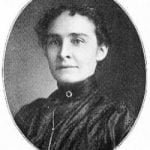
The superintendent, teachers, students and friends of Oak Hill were called upon to sustain a great loss and experience a deep sorrow, as the sun was setting, on June 5, 1908, when Adelia M. Eaton, our highly esteemed matron, after three and one half years of unusually efficient service, and a brief illness of one week after the end of the term, peacefully and trustfully passed from the scene of her faithful missionary labors, to the enjoyment of her eternal reward. Her illness, which terminated with heart failure, seemed to be the outcome of a weariness that ensued after rendering some voluntary but needed services for the comfort of others.
She was the second daughter of Harvey Eaton, one of the hardy, prosperous pioneer farmers of Pocahontas County, Iowa. She grew to womanhood on the farm, where she learned to be industrious and earnest.
She early became identified with the work in the Presbyterian Church and Sunday school at Fonda where she received her first training in Christian work. After enjoying a four years’ course at Buena Vista College, Storm Lake, associated with her elder sister, she spent four years in mercantile pursuits in Sioux City and Fonda. All of these previous employments and experiences seemed to be parts of a varied training, to fit her most fully, for the position she filled as a missionary teacher at the Academy. In the management of the affairs of this institution, her responsibilities and duties made her the executive helper of the superintendent. Here she found responsibilities and opportunities, that called forth all her noblest powers, and enabled her to make it the most highly useful and crowning period of her life.
She naturally possessed an attractive personality. She was tall, slender and erect in form, very prompt, dignified and graceful in movement. Her countenance indicated intelligence, energy and culture. She had a good voice for public address, possessed rare executive ability and was so gentle in manner that obedience to her commands was accorded with pleasure and delight. Though never unmindful of her resources, she never manifested any pride, save that which every truly noble soul manifests in the quality of its work, by putting forth a constant effort to perform every duty in the most thorough and efficient manner.
She was a happy, willing worker. The key note of her work as a teacher seemed to be the one expressed in the words: “My meat is to do the will of Him that sent me and to finish his work.” John 4, 34. Although she had many other important duties on that day, she was always present at the services on the Sabbath. The memory of the living will not soon forget the personal interest she manifested in the spiritual welfare of every member of her large class of older students in the Sunday school, her tender and affectionate appeals to the young people at the Endeavor meetings, her interesting and instructive addresses at institutes and conventions, and how she voluntarily lingered to extend friendly greetings at the close of the Church services.
The call, to engage in this educational work among the Freedmen in Indian Territory, came to her at an unexpected, but opportune time. When the need for her services and desire for her co-operation were stated, she immediately gave her assent to make a trial of the work for a term of three months. As the work progressed her interest in it increased, and she became more firmly attached to it. Her affections, interest and ambitions seemed to be transferred to the people and work at the Academy. Her attachment and devotion to this work was as remarkable as it was unexpected. This was the secret of the unusual merit of the service rendered. In this new sphere of usefulness, she found a field of opportunity that afforded full scope for the exercise of all her intellectual, moral and spiritual powers, and, engaging in this work with all the enthusiasm of her noble nature, she rendered a continuous service so faithful and efficient, as to call forth heartfelt appreciation and words of highest commendation.
